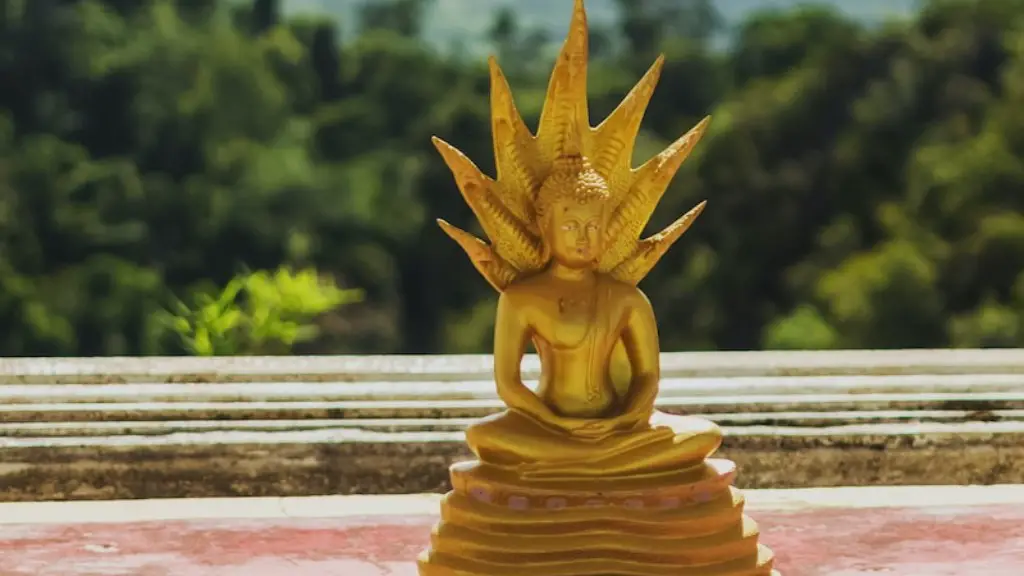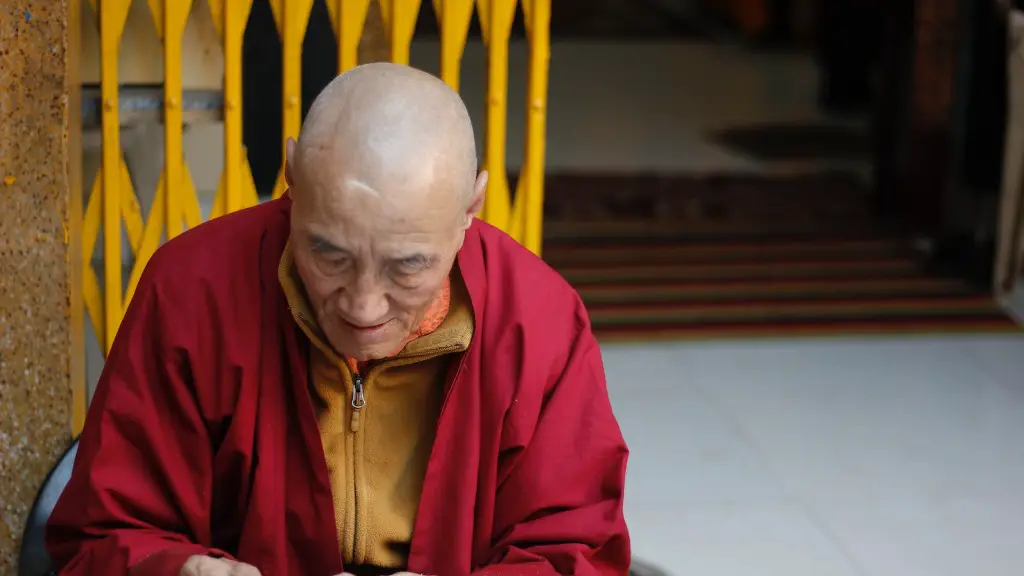Hinduism is a major religion of the Indian subcontinent that traces its roots to the Indus Valley civilization about 4,500 years ago. It is a faith that encompasses a variety of beliefs, worshipped by well over one billion people across the world.
Amongst the many gods and goddesses that make up the Hindu pantheon, the most powerful, ultimate deity is Vishnu. Vishnu is one member of the Hindu trinity – the other two members being Brahma and Shiva. It is believed that Vishnu is the preserver, protector and sustainer of the universe, that propagates and perpetuates the Hindu cycle of life, death and rebirth.
Vishnu is usually depicted in Hindu iconography as having four arms, and usually holds a conch in one hand, a discus in another, a mace in a third, and the lotus in the fourth. His iconic image is the often represented as being a blue-colored skinned man. Vishnu is associated with many divine attributes, including compassion and mercy, and it is believed he is the one who descends to Earth in various forms to protect the weak who are suffering.
Vishnu has many avatars, or incarnations, including Rama, Krishna, and a fish known as Matsya. One of the most popular Hindu texts, the Bhagavad Gita, is attributed to Krishna, an avatar of Vishnu. It is said to provide an insight into the meaning of life and be a guide for ethical and moral living.
Vishnu and his consort, goddess Lakshmi, are worshipped in both home and temple settings and have many stories and legends associated with them. He is considered to be the supreme deity in Hinduism and is often invoked or referred to during religious ceremonies, particularly those related to marriage or death.
In addition to Vishnu, Hinduism is also centred on other Gods and Goddesses who are considered to be either the source of, or are closely associated with, Vishnu’s powers. Shiva and Brahma, two of the main deities, accept their subordinate status to Vishnu, as evidenced by numerous texts and scriptures. Shiva is Vishnu’s complement in that he creates and destroys, where Vishnu only creates and sustains.
Despite the fact that other gods are worshipped and respected, it is Vishnu who is hailed and praised as the ultimate, supreme being in Hinduism, who is believed to protect and nurture the universe, and all its inhabitants, during times of chaos, turmoil, and imbalance.
Shakti
Shakti is the concept of divine feminine energy in Hinduism and is often portrayed as a divine consort of the god Shiva. While Shiva is the main deity, the divine feminine Shakti is equally important in the practice and theology of Hinduism. She is seen as the masculine energies of Shiva’s and Vishnu’s consorts.
Shakti is worshipped in order to gain strength and power and is seen as a source of divine energy. She is often depicted as a form of the goddess Durga or Kali and is believed to be an independent deity with her own power and abilities. In Hinduism, all deities are seen as being aspects of the divine feminine (Shiva, Vishnu, and Brahma are all aspects of the supreme feminine Shakti).
Shakti is believed to be the life force behind all creation and is essential for the sustenance and protection of all life forms. As the creative and sustaining energy of the universe, Shakti is venerated in her various forms and aspects, including through rituals, prayers, and offerings.
Shakti is believed to be the source of all power and strength and is seen as the embodiment of compassion, love, and kindness. As such, she is seen as a kind and benevolent mother figure who can be invoked and appealed to when in need of help, healing, and protection.
In the Hindu pantheon, Shakti is viewed as the ultimate source of divine power, and is believed to be the mother of all gods and the creator of the universe. She is seen as the embodiment of both creative and destructive energies, and is venerated in her many forms and aspects.
The Trinity
The Three Supreme deities in Hinduism, Brahma, Vishnu and Shiva, form the trinity, or tridevi – a unified but also distinct entity which is worshipped and venerated in many Hindu traditions. The trinity is often symbolized as a fire, which has three branches representing the three gods. This symbolizes their unity and interdependence.
Brahma is the creator, Vishnu is the preserver and protector, and Shiva is the destroyer or transformer. The trinity is known for its balancing act, with each member of the trinity representing different aspects and attributes of the divine.
Brahma is believed to be the supreme creator of the universe, who creates the cosmic cycle of birth, death and rebirth. Vishnu, being the preserver, protects the universe and is believed to take ten incarnations in times of need. Shiva is the destroyer, or transformer, who brings about change and renewal.
The trinity is responsible for the law of karma, or causality, which dictates the nature of the universe. This law states that all actions have consequences and that a person’s past actions will determine their current and future circumstances. The concept of karma is thus closely associated with the trinity.
The trinity, then, is a unified representation of all the major gods in Hinduism and is seen as the source of all divine power. All three members of the trinity, working together, can bring about balance and harmony in the universe.
Influence Of Vedic Texts
Many of the beliefs and practices of Hinduism have been shaped and influenced by the Vedic texts, a collection of ancient Sanskrit scriptures that form the religious and philosophical foundation of Hinduism. The Vedas are one of the most important sources of knowledge of the early Indian civilization and provide a comprehensive account of Indian religious, philosophical and scientific thought.
The texts are divided into four great books, each containing several sections and chapters. They are composed of hymns, rituals, and philosophical meditations, and emphasize the importance of the worship of the gods and goddesses, particularly the trinity of Vishnu, Shiva and Brahma.
The Vedas play a major role in the worship and devotion to a variety of gods and goddesses, and in Hindu culture, they are considered to be the ultimate source of truth and wisdom. The texts provide a comprehensive account of the Hindu faith and its principles, and are the primary source from which Hindu beliefs and practices have been derived from.
The Vedas not only emphasize the importance of the trinity, but also the importance of worshipping the goddesses in the Hindu pantheon. They promote the concept of a divine feminine, known as Shakti, and her importance in Hindu culture, which is based on the notion of a duality of male and female principalities.
The Vedas provide numerous stories, hymns and rituals which emphasize the importance of various deities, including Vishnu. They also discuss the notion of karma, the idea of cosmic balance, and the importance of serving and honouring the gods and goddesses.
Conclusion Of Ultimate God In Hinduism
In Hinduism, Vishnu is considered to be the ultimate, supreme deity and preserver of the universe. He is one of the three main gods in the Hindu trinity, along with Brahma and Shiva. Vishnu is associated with many divine attributes and is believed to protect the weak and protect the universe during times of chaos and imbalance.
Vishnu is often accompanied by his consort Lakshmi and has numerous avatars (incarnations), including Rama and Krishna. The Bhagavad Gita, a widely popular Hindu text, is attributed to Krishna, an avatar of Vishnu. It is said to provide an insight into the meaning of life and be a guide for ethical and moral living.
In addition to Vishnu, Hinduism is also centred around other gods and goddesses, including Shakti and Shiva, who are seen as aspects of the divine feminine energy. The Vedas, a collection of ancient Sanskrit scriptures, provide a comprehensive account of Hindu beliefs and practices, and play a major role in the worship of gods and goddesses, particularly the trinity of Vishnu, Shiva and Brahma.

